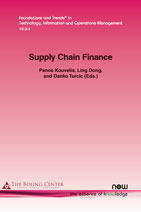Impact of Trade Credit Financing on Firm Performance in Supply Chains
By Hsiao-Hui Lee, University of Hong Kong, Hong Kong, hhlee@hku.hk | Jianer Zhou, Accenture, Boston, USA, jianer.zhou@accenture.com | Jingqi Wang, University of Hong Kong, Hong Kong, jingqi@hku.hk
Abstract
Using a dyadic panel dataset that links U.S. suppliers with their major buyers, we study the impact of trade credit on firm performance. In particular, we make the distinction between an industry-average trade credit and an individual supply chain’s deviation from such an industry average. When suppliers offer trade credit at their industry-average level, this action facilitates trade and, thus, is positively associated with both parties’ performance; conversely, when suppliers are more aggressive in their trade credit strategy than the industry average, then the excess trade credit is negatively associated with buyer performance. One managerial message from our research is that buyers should be cautious about trade credit far exceeding the industry-average level.
Supply Chain Finance
Supply Chain Finance focuses is on creating liquidity in the supply chain through various Buyer or Seller-led solutions with or without a facilitating technology. The role of supply chain finance (SCF) is to optimize both the availability and cost of capital within a given buyer-supplier supply chain. To add further value, information on the physical flow of goods can be monitored. The coupling of information enables lenders to mitigate financial risk within the supply chain. The mitigation of risk allows more capital to be raised, capital to be accessed sooner, or capital to be raised at lower rates. Supply chain participants reside in diverse economic environments, are of different sizes, face a variety of uncertainties, have different bargaining powers over its trading partners, and have different accessibilities to capital markets. Many forms of financing arrangements between buyers and suppliers have emerged intending to overcome challenges in their specific economic and business environments.
Part 1 examines Supplier Financing. The three papers included in this section discuss supplier based financing issues including: motivation and rationale for supplier based financing, the optimal mix of bank financing and supplier financing, and empirical study of the impact of trade credit on firm performance. Part 2 focuses on Buyer Financing including three papers included that discuss buyer based financing issues in supply chains including the rationales of different types of buyer based financing arrangements and their impacts on supply chain performance. Part 3 reviews Inventory Models and Financing Consideration and the two papers in this part of the book explore how to coordinate the management of the cash flow and inventory flow within an organization and the relationship between a firm’s inventory policy and its cost of capital. Part 4 examines Operational Investments and Financing Issues and includes four papers that address operational investments with explicit financing considerations.

Companion
Foundations and Trends® in Technology, Information and Operations Management, Volume 10, Issue 3-4 Special Issue: Supply Chain Finance
See the other articles that are also part of this special issue.